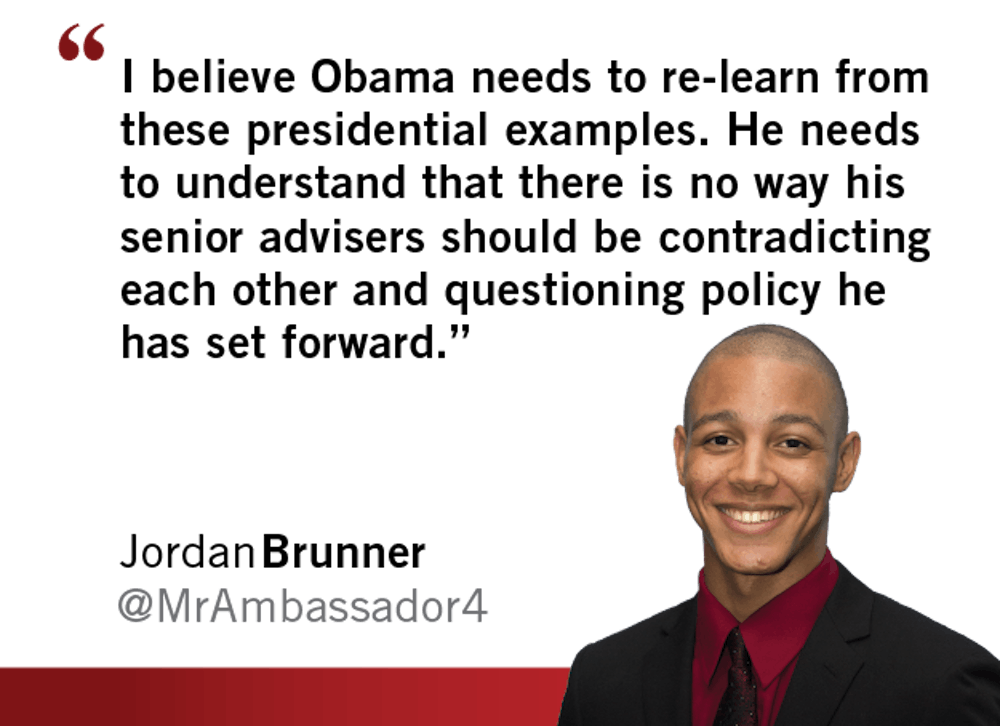The U.S. public measures the president on foreign policy by how well he can handle our enemies while also bolstering our allies.
But this is not always the real measure of the president's strength on foreign policy issues. The better measure of presidential strength is often how well he can handle his own staff of advisers and chiefs. More often than not, the worst enemies of presidential effectiveness don’t come from the opposition in Congress, or even from foreign enemies abroad; they come from within his own administration.
President Barack Obama is experiencing this kind of test of strength right now. His national security team can’t seem to come to a consensus. First, there was no strategy on how to combat ISIS, and the strategy that did belatedly come is very limited in scope. His team then ignored the significant implications of the Ebola epidemic in West Africa, isolating itself from the problem and failing to galvanize the international community to create a response to it until the end of September.
 If that is not enough, Obama’s top advisers are now fighting one another about issues on which the administration should be united. Just the other day, Secretary of Defense Chuck Hagel sent a strongly worded memo to National Security Adviser Susan Rice blasting her handling of the crisis in Syria because her recommendations to the President need “to have a sharper view of what to do about the Assad regime.”
If that is not enough, Obama’s top advisers are now fighting one another about issues on which the administration should be united. Just the other day, Secretary of Defense Chuck Hagel sent a strongly worded memo to National Security Adviser Susan Rice blasting her handling of the crisis in Syria because her recommendations to the President need “to have a sharper view of what to do about the Assad regime.”
On top of all of that, Secretary of State John Kerry has recently been criticized by White House officials for his off-hand comments regarding Israel and other issues that are central to White House strategy. Certain aides have begun comparing him to Sandra Bullock in the film “Gravity,” due to the seeming disconnect between his comments and the official White House platform.
This disunity within the ranks of the Obama Administration national security team is obviously causing the administration embarrassment both in the ways it handles the many crises that have come its way and as a cohesive unit. It has been speculated that Obama will begin shaking up his national security team in an effort to re-establish control and bring in fresh vision.
Of course, he wouldn’t be the first president to make this move, especially during a time of war. Former President George W. Bush was also forced to part with a member of his Cabinet, former Secretary of Defense Donald Rumsfeld because of his handling of the war in Iraq. Rumsfeld was not demonstrating the sort of leadership needed during war, and he was at odds with everyone in the White House and the State Department. Therefore he was necessarily let go by Bush.
But instead of shaking up his national security team, perhaps the most poignant presidential example that Obama can learn from is Abraham Lincoln’s. Although Lincoln was famous for firing generals who didn’t meet his expectations, his handling of his top national security brass was quite different. Instead of shaking up the team and bringing in fresh blood when Cabinet members argued among each other or questioned his authority, Lincoln stayed constant. He stuck to his purpose, made his policy goals clear and took full responsibility for those policy goals. His Cabinet members either had to fall in line or suffer the consequences.
The late John F. Kennedy, in his disagreements with his generals, also took this track. He refused to let his generals and his national security team bully him, and always used his own judgment when handling a situation, looking at all the options available. What is most surprising about all of this is that usually Obama has taken the lessons which Lincoln and Kennedy have given very seriously. This was especially true during his handling of the Osama bin Laden raid, when he overruled senior members of his administration and made the final decision to raid the compound.
Therefore, I believe Obama needs to re-learn from these presidential examples. He needs to understand that there is no way his senior advisers should be contradicting each other and questioning policy he has set forward. If they disagree with his way of handling the conflict, they need to resign; it’s as simple as that. Take charge, Mr. President. Make your stance clear, so your administration can move forward.
Reach the columnist at jbrunne2@asu.edu or follow him on Twitter @MrAmbassador4
Editor’s note: The opinions presented in this column are the author’s and do not imply any endorsement from The State Press or its editors.
Want to join the conversation? Send an email to opiniondesk.statepress@gmail.com. Keep letters under 300 words and be sure to include your university affiliation. Anonymity will not be granted.
Like The State Press on Facebook and follow @statepress on Twitter.




